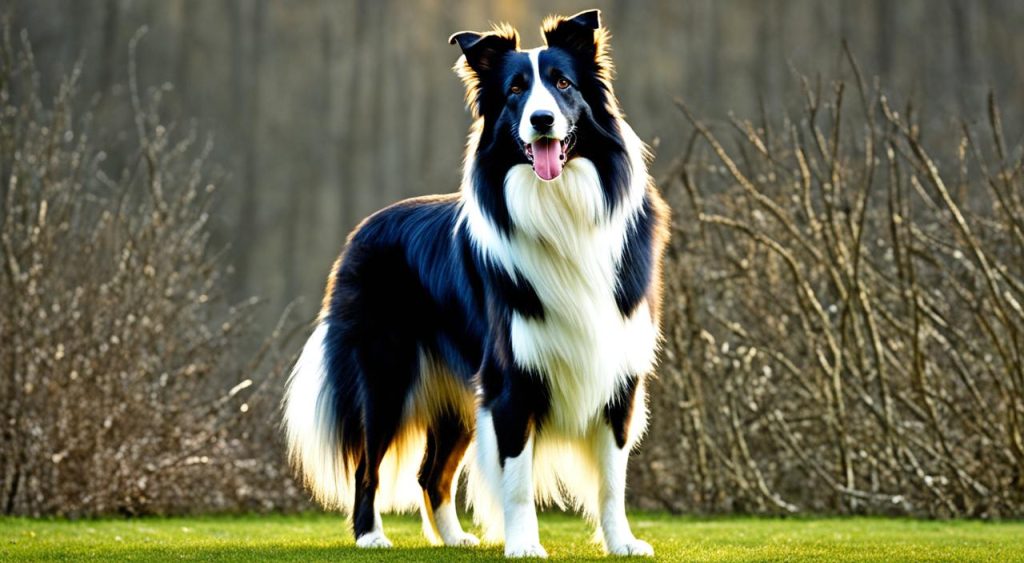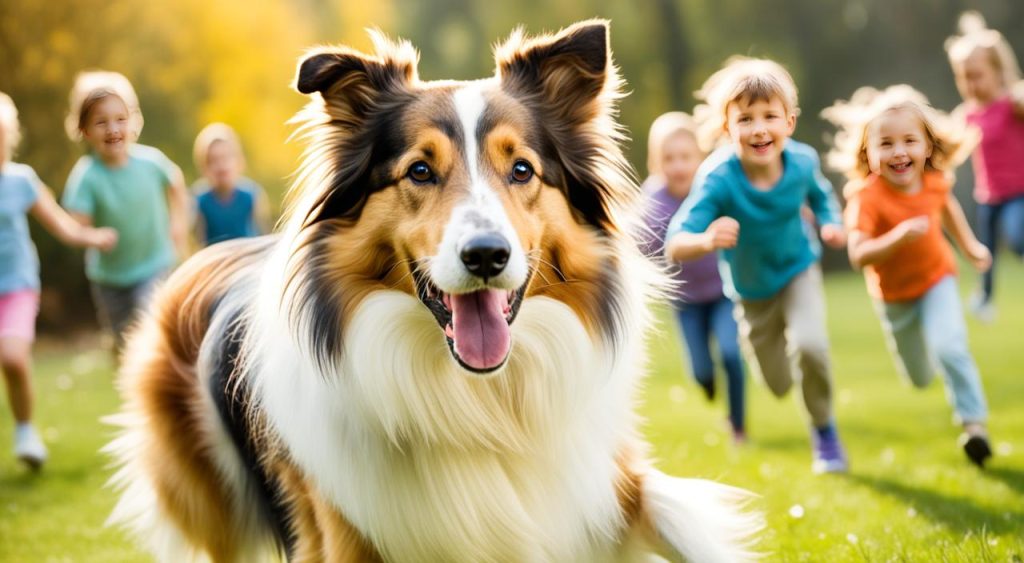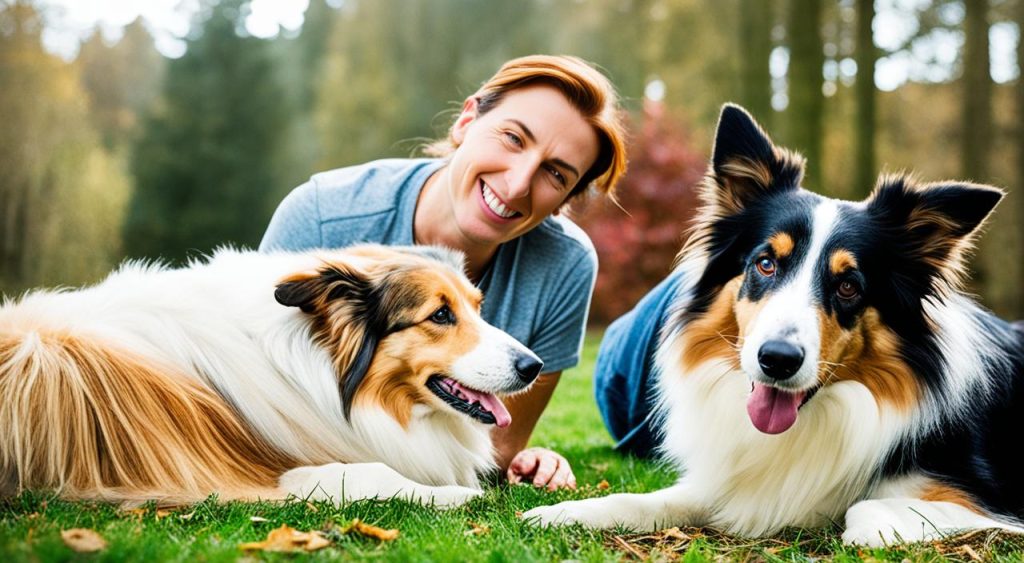Collies, with their beautiful coats and intelligent demeanor, are beloved companions for many dog owners. However, like any other breed, Collies can experience behavioral issues that may pose challenges for both the dog and its owner. Understanding and addressing these behavioral concerns is essential for creating a happy and harmonious environment for your Collie. In this article, we will explore the common behavioral problems that Collies may exhibit, their underlying causes, and effective strategies for managing and resolving them.
Key Takeaways:
- Collies can exhibit various behavioral issues, including chasing, herding, excessive vocalization, chewing, digging, attention seeking, aggression, dominance, separation anxiety, and obsessive-compulsive disorder.
- These behavioral issues are often rooted in Collies’ inherited traits and instincts, such as their strong instinct to chase, herd, bond, watch, and listen.
- Keeping Collies in environments that don’t align with their natural instincts or fail to provide sufficient mental and physical stimulation can contribute to behavioral problems.
- Common behavioral problems in Collies include aggression, excessive vocalization, chewing, digging, and separation anxiety.
- Early intervention, consistent training, and environmental enrichment can help address and prevent behavioral issues in Collies.
Inherited Traits and Their Impact on Collie Behavior
Border Collies have been selectively bred for centuries to possess specific traits that are favorable for their work as sheepdogs. These traits include a strong instinct to chase, herd, bond, watch, and listen. They also have heightened sensitivity to movement and sound, along with enhanced intelligence and the ability to work independently. These traits are suitable for a quiet rural environment where Collies can fulfill their working responsibilities. However, when Collies are kept in environments that conflict with their natural instincts or do not provide sufficient mental and physical stimulation, behavioral problems may arise.
Collies have inherited instincts that drive their behavior. Their strong instinct to chase and herd is a result of their breeding as working dogs. This instinct can manifest in behaviors such as nipping at heels and chasing moving objects. Their heightened sensitivity to movement and sound makes them alert and responsive, allowing them to excel in their herding duties.
Collies’ enhanced intelligence and independent nature also play a significant role in their behavior. They have the ability to think and problem-solve independently, which can lead to creative and sometimes mischievous behaviors if not properly stimulated.
It is important to recognize and understand these inherited traits to effectively manage Collie behavior. Providing a suitable environment that caters to their instincts and provides mental and physical stimulation is crucial in preventing behavioral issues. Failure to do so may result in Collies becoming bored, frustrated, or anxious, leading to problematic behaviors such as excessive barking, chewing, or digging.
Next, we will explore the environmental factors that can contribute to behavioral problems in Collies.
Environmental Factors Contributing to Behavioral Problems in Collies
Behavioral problems in Collies often arise when they are kept in environments that do not align with their inherited drives and sensitivities. These issues can include conflicting environments, overstimulation, and a lack of mental and physical fulfillment. When Collies’ natural instincts and needs are not adequately met, they may exhibit problematic or antisocial behavior, resulting in disruption and difficulty in a domestic human environment.
To prevent behavioral issues from arising in Collies, it is crucial to create an environment that supports and satisfies their inherent traits and requirements. This involves providing the necessary mental and physical stimulation for their active minds and bodies. Collies thrive when they have opportunities to engage in activities that fulfill their instincts, such as herding or chasing. Additionally, a calm and peaceful setting can help reduce overstimulation and create a more balanced and relaxed atmosphere for Collies.
“Collies need an environment that allows them to express their natural behaviors and instincts in a controlled and appropriate manner. Without proper outlets, they can easily become frustrated and exhibit behavioral problems,” says Dr. Sarah Mitchell, canine behavior specialist.
Incorporating activities such as daily exercise, interactive playtime, puzzle toys, and training sessions can help fulfill Collies’ mental and physical needs. Providing an enriched environment that includes sensory stimulation, socialization opportunities, and environmental challenges can also contribute to their overall well-being and prevent behavioral issues.
Common Behavioral Problems in Collies
Collies are an intelligent and active breed, but they can also be prone to certain behavioral issues. Understanding and addressing these common problems is essential for both the well-being of your Collie and the harmony of your household.
One of the most common behavioral problems in Collies is aggression. This can manifest as territorial aggression, fear aggression, or aggression towards other animals or people. It’s important to recognize the triggers and address them through proper training and behavior management techniques.
Attention seeking behaviors, such as barking, jumping, or pawing, are also common in Collies. These behaviors can be disruptive and may stem from a lack of mental and physical stimulation. Providing appropriate outlets for your Collie’s energy, such as interactive toys and regular exercise, can help reduce attention-seeking behaviors.
Biting, nipping, and gripping behaviors can also be problematic. These behaviors may be a result of herding instincts or a lack of proper socialization and training. Consistent obedience training and positive reinforcement techniques can help redirect these behaviors into more acceptable forms of interaction.
Chasing is another behavioral issue commonly seen in Collies. Their herding heritage makes them prone to chasing moving objects, including cars, bicycles, and small animals. This behavior can be dangerous and requires diligent training and supervision to prevent accidents and keep your Collie safe.
Dominance is a behavior that can manifest in Collies, leading to conflicts with other dogs or assertive behavior towards their owners. Establishing clear rules and boundaries, along with consistent obedience training, can help address dominance-related issues.
Excessive vocalization, including barking and whining, is a challenge many Collie owners face. Collies are known for their alertness and tendency to vocalize, but excessive vocalization can be disruptive. Training techniques that focus on teaching your Collie to be quiet and rewarding calm behaviors can help alleviate this problem.
In addition to these behavioral issues, Collies may also exhibit excessive chewing, digging, inappropriate soiling, obsessive-compulsive disorder, and separation anxiety. Each of these issues requires a specific approach tailored to the individual Collie, and consulting with a professional trainer or behaviorist can be invaluable in addressing these challenges effectively.
Early Intervention and Training for Collie Behavioral Issues
When it comes to resolving Collie behavioral problems, early intervention is key. The longer a problematic behavior is practiced, the more challenging it becomes to address. That’s why seeking help as soon as behavior issues arise is crucial for Collie owners.
Training and behavior modification techniques are effective strategies for managing and resolving behavioral issues in Collies. By redirecting the dog’s attention, providing mental and physical stimulation, and reinforcing positive behaviors, you can make significant progress in addressing problem behaviors.
Consulting with a professional trainer or behaviorist who specializes in Collies can provide valuable guidance and support. These experts have the knowledge and experience to develop a customized training plan that addresses your Collie’s specific needs and challenges.
Training your Collie early on not only helps address current behavioral problems, but also sets a solid foundation for their future behavior. Collies are quick learners, and with consistent training, you can shape their behavior to be more in line with your expectations.
Remember, handling Collie behavior problems requires patience, consistency, and positive reinforcement. Through early intervention and targeted training, you can help your Collie become a well-behaved and happy companion.
Fear and Anxiety in Collies
Collies, like any other breed, can experience fear and anxiety-related behavioral problems. This may manifest as fearfulness towards strangers, other dogs, or certain situations. Separation anxiety is also a common issue in Collies, leading to destructive behaviors when left alone.
Understanding the triggers and underlying causes of fear and anxiety in Collies is essential in addressing these issues effectively. Implementing appropriate behavior modification techniques, including desensitization and counterconditioning, can help alleviate fear and anxiety in Collies.
Desensitization involves gradually exposing the Collie to the source of fear or anxiety in a controlled and positive manner, while counterconditioning focuses on replacing negative associations with positive ones.
Through patient and consistent training, Collies can learn to overcome their fears and anxieties, enabling them to live happier and more relaxed lives. By providing a supportive and nurturing environment, along with positive reinforcement and reassurance, you can help your Collie build confidence and develop coping mechanisms for dealing with anxiety.
Remember, every Collie is unique, and it is important to consult with a professional dog trainer or behaviorist who has experience working with Collies to tailor a customized approach that suits your dog’s specific needs.
Prevention and Environmental Enrichment for Healthy Collie Behavior
Prevention and proactive management play vital roles in maintaining healthy behavior in Collies. By taking the necessary steps to prevent behavior problems before they arise, you can ensure a harmonious and balanced relationship with your Collie. One key aspect of prevention is providing appropriate mental and physical stimulation.
Engaging your Collie in regular exercise, such as daily walks or playtime, can help release excess energy and prevent boredom. Socialization is equally important, as it exposes your Collie to various people, animals, and environments, helping them develop proper social skills.
Training from an early age is essential in preventing behavior problems. Establishing a consistent and structured routine helps your Collie understand boundaries and expectations, contributing to a well-behaved and balanced dog. Reinforce positive behaviors through reward-based training techniques, such as praise and treats, to encourage healthy behavior in your Collie.
“Preventing behavioral issues is easier than resolving them. By providing mental and physical fulfillment through exercise, socialization, and training, you can promote healthy behavior in your Collie.”
Environmental enrichment is another crucial aspect of preventing behavior problems. Providing stimulating toys, puzzles, and interactive games can keep your Collie mentally engaged and satisfied, reducing the likelihood of problematic behaviors. Rotate toys regularly to maintain novelty and prevent boredom.
Creating a safe and comfortable environment for your Collie is also essential. Ensure they have a designated area where they can rest and relax, away from any stressful stimuli. Additionally, consider the use of pheromone diffusers or calming aids to help reduce anxiety and promote a sense of calm in your Collie.
By taking a proactive approach to prevent behavior issues and enriching your Collie’s environment, you can foster a healthy and well-behaved companion for years to come.
Consistency and Communication in Collie Training
Consistency is the key to successful training of Collies. When it comes to training your Collie, sending mixed messages and having inconsistent expectations can confuse your dog and hinder the training process.
Collies are known to respond well to clear communication and positive reinforcement-based training methods. By setting clear boundaries, establishing rules, and consistently rewarding desired behaviors, you can effectively communicate your expectations to your Collie and reinforce good behavior.
It is essential to understand that Collies have their own unique way of thinking and perceiving the world. Taking the time to understand their perspective can greatly enhance your training efforts and strengthen the bond between you and your canine companion.
Remember, consistency and effective communication are the cornerstones of successful Collie training. Stay consistent with your training techniques, be clear in your messages, and always reward your Collie for their good behavior.
<!– em>a quote if relevant –>
Identifying and Addressing Destructive Behaviors in Collies
Collies can occasionally display destructive behaviors, such as excessive chewing, digging, and barking. These behaviors are often a result of boredom, anxiety, or a lack of proper outlets for their energy. It is important to understand the underlying causes of these destructive tendencies and take appropriate measures to address them.
To address destructive behaviors in Collies, providing them with mental and physical stimulation is crucial. Engaging toys, interactive playtime, and regular exercise can help fulfill their needs and redirect their energy towards positive outlets. Additionally, training and environmental management play a key role in preventing damage to property.
By identifying the underlying causes of destructive behaviors and addressing them through appropriate stimulation, training, and environmental enrichment, owners can effectively redirect these tendencies. It is important to create an environment that offers engaging activities and provides outlets for their natural instincts.
Addressing destructive behaviors in Collies requires consistency and patience. By establishing a structured routine and setting clear boundaries, Collies can learn what is expected of them and develop healthier behaviors. Positive reinforcement-based training methods can also be used to reinforce desired behaviors and discourage destructive tendencies.
Remember that every Collie is unique, and understanding their individual needs and preferences is essential. If you are facing challenges with your Collie’s destructive behaviors, consulting with a professional trainer or behaviorist who specializes in Collies can provide valuable guidance and support.
Conclusion
Collies are a unique breed with specific inherited traits and sensitivities, which can lead to behavioral issues. However, with the right approach, these challenges can be effectively managed and resolved. By understanding their instincts and providing appropriate mental and physical stimulation, you can help your Collie lead a balanced and happy life.
Early intervention is key when dealing with behavioral problems in Collies. Addressing issues promptly and seeking professional guidance can prevent them from escalating and becoming more difficult to manage. Proactive prevention, such as socialization, training, and establishing a structured routine, can also contribute to preventing behavioral problems from arising.
Regular communication with your Collie is vital for a successful and harmonious relationship. By consistently setting boundaries and reinforcing positive behaviors, you can establish clear expectations and enhance your Collie’s understanding. Remember that Collies have their own unique way of perceiving the world, so effective training and consistent communication are essential.





